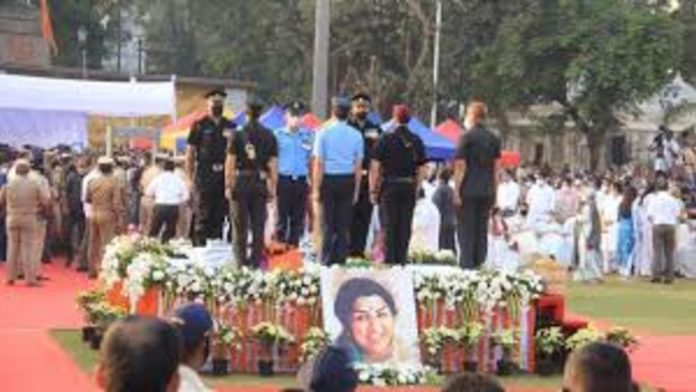After passing away at the age of 92, Lata Mangeshkar, the “nightingale of India,” was honoured with a state burial on Sunday.
“After almost 28 days after Covid-19 diagnosis, Lata Di died at 8:12 a.m. owing to multi-organ failure,” Mangeshkar’s doctor, Dr. Pratit Samdani, informed reporters outside Breach Candy Hospital.
According to a message on his verified Twitter account, Indian Prime Minister Narendra Modi paid his condolences to Mangeshkar at the funeral.
Shah Rukh Khan and Aamir Khan from Bollywood attended the wake, as did cricket legend Sachin Tendulkar.
For the late musician, the Indian government has declared two days of national mourning. The national flag will be flown at half-staff from Sunday through Monday, according to a statement released by India’s Ministry of Home Affairs on Sunday. “No formal entertainment will be provided,” the ministry noted.
Mangeshkar was a playback singer — providing music to be mimed by actors — for innumerable Indian movies. Her sweet voice, which could easily reach a high pitch, became a staple in practically every Indian household.
Narendra Modi, India’s prime minister, said he was “anguished beyond words.”
“Lata Didi (sister), who was sweet and caring, has passed away. She has left an unfillable vacuum in our country “On Sunday, he posted on Twitter. “Generations to come will remember her as a pillar of Indian culture, whose melodic voice had an unrivalled ability to hypnotise audiences.”
On Sunday, Bollywood actors and politicians paid tribute to the late actor.
“Such a voice is impossible to forget! My heartfelt sympathies and prayers go out to Lata Mangeshkar ji on her passing “Akshay Kunar, an actor, took to Twitter to express his feelings.
In a tweet, Rahul Gandhi, a member of the opposition Congress party, expressed his condolences. “For many decades, she was India’s most cherished voice,” he remarked. “Her golden voice is everlasting, and it will live on in the hearts of her admirers.”
In a tweet, Pakistan’s Prime Minister Imran Khan also paid tribute to the artist. “Lata Mangeshkar’s death has left the subcontinent without one of the world’s truly great singers. Many individuals around the world have derived great pleasure from listening to her tunes.”
Mangeshkar began studying classical Indian music with her father when she was five years old. Deenanath Mangeshkar, her father, was a well-known classical vocalist and theatre actor. His daughter began her singing career by performing in his musical productions.
Mangeshkar made her first public appearance at the age of nine and recorded her first song at the age of thirteen. Her father died a month after she recorded her first song. Mangeshkar began working in the Indian film industry to support her mother and four younger siblings. Music directors first dismissed her, claiming that her voice was too thin and harsh. She had already lent her voice to a half-dozen films by 1948.
Mangeshkar was born on September, 28, 1929 in Madhya Pradesh. She was introduced to various composers, including Aman Ali Khan, who mentored and coached her for several years, thanks to her father’s status in the classical music world.
Mangeshkar’s career took off after she delivered a string of songs, making her one of the most in-demand playback singers in the country. In Indian films, it is normal practise for the music director to include eight to ten songs that play in time with the plot.
Singers like as Mangeshkar were recruited to pre-record the songs, to which the actors would lip sync or a sequence would be shown on screen. Unlike in Hollywood, where performers produce albums and the music is acquired for a certain film, in India, singers create music and lyrics exclusively for the film.
Her big break came in 1949 with the film “Mahal,” for which she sang the infamous “Aayega Aanewala” song. In 1958, she received her first filmfare award for the song “Aaja Re Pardesi” from the film “Madhumati,” and in 1973, she earned her first national film award for “Beeti Na Bitai” from the film “Parichay.”
Madan Mohan, R.D. Burman, Gulzar, and A.R. Rahman were among the outstanding composers and lyricists of the time, and she gave voice to their music and poetry. Composers wrote music with her voice in mind, and music directors paused their work to meet her tight schedule.
She also performed “Aye Mere Watan Ke Logon,” a song written to motivate the country’s citizens following the Indo-China conflict in 1963. It became an anthem, with Mangeshkar being begged to perform it at every performance.
She was given the Bharat Ratna, India’s highest civilian accolade, in 2001. In 1999, she was also given the Padma Vibushan, India’s second highest civilian award. Mangeshkar has performed in over five languages for various Indian film industries.
Mangeshkar mentioned one regret in a 2009 interview with a news programme. “I had a strong desire to pursue a career as a classical vocalist. However, I had so many duties when I first started working that I was unable to listen to classical music. I couldn’t practise because I didn’t have enough time “she stated
Mangeshkar lent her voice to more than 1,300 movies and sang over 25,000 songs. “Eternal Sunshine of the Spotless Mind,” “Life of Pi,” “Lion,” and “The Hundred-Foot Journey” have all featured her music.
Mangeshkar has gradually decreased her workload over the last two decades to just a couple of films per year. Preferring to stay out of the limelight, she rarely spoke about her personal life.
In an in interview, Mangeshkar was once asked what contributed to her success as a playback singer.
“Natural talent accounts for about 75% of the total, with the rest coming from hard work, practise, and dietary restrictions,” she explained. “I’m not a fan of limitations… I’ve spent my entire life singing.”




